Evo Fashion: Cohort Two Graduates at The Backroom Pitch!
On Tuesday, the spotlight shone brightly at The Trampery Old Street, where The Backroom Pitch marked the finale of the Evo Fashion programme. An evening steeped in innovation and ingenuity, the event brought together 24 start-ups, each with a vision to transform the fashion industry. From trailblazing sustainability solutions to bold new technologies, the event was a celebration of purpose-driven entrepreneurship, showcasing the power of creativity and dedication in tackling the fashion industry’s most pressing issues.
As the final Evo Fashion event of the year, The Backroom Pitch not only concluded the programme but also represented the beginning of an exciting new chapter in our founders’ entrepreneurial journeys. For each start-up, it was an opportunity to gain invaluable insight into their business’s potential – insight that will shape the future of their ventures. The event also provided an opportunity to connect with investors, business advisers, and industry experts, all eager to engage with the next wave of breakthrough ideas.
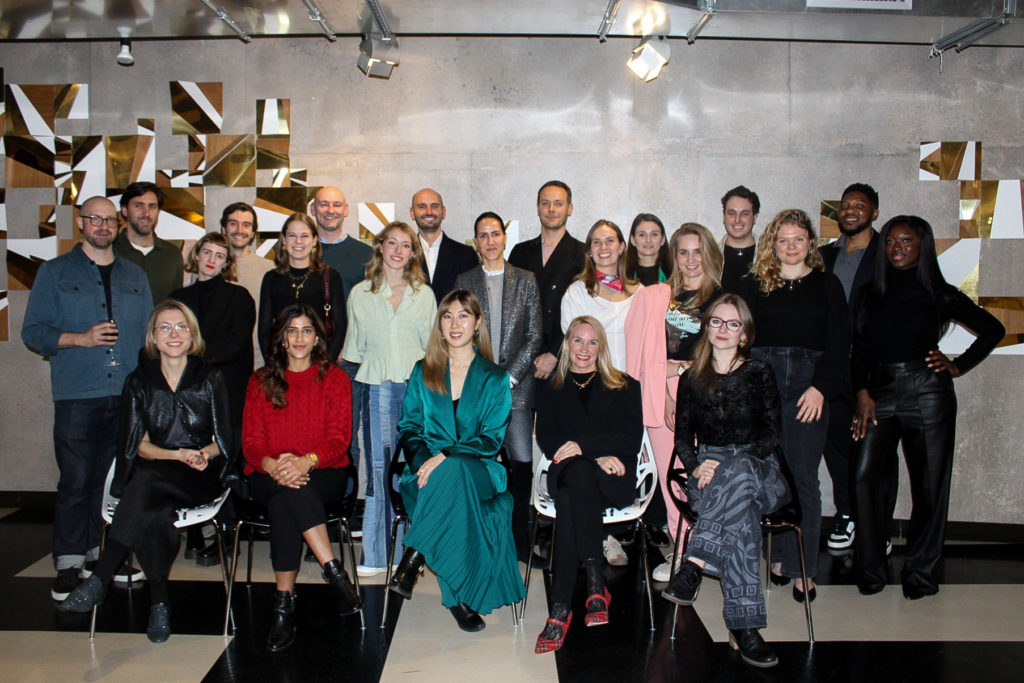
Evo Fashion
Delivered in partnership with Evo Learning – a training subsidiary of The Trampery, as part of London & Partners’ Grow London Early Stage Programme funded by the UK Shared Prosperity Fund – Evo Fashion delivered an experiential programme for start-ups and early-stage businesses that took an holistic approach to business strategy, helping them drive economic growth while also integrating sustainability into every aspect of their businesses.
Designed to fit in with work commitments and delivered by experts, the programme consisted of a two-day intensive launchpad and four full-day masterclasses which focused on different aspects of learning, including environmental and social governance, opportunities for innovation, sustainable growth and investment, finance and business planning, and founder wellbeing, leadership and impactful teams. Peppered in amongst the sessions and masterclasses, there was tailored 1-2-1 mentoring, three peer-to-peer learning workshops, and the opportunity to showcase and pitch to investors, business advisors, and industry experts at this week’s Backroom Pitch.
About The Backroom Pitch
Taking place across two spaces within The Trampery, the event saw founders pitch to carefully selected panels.
In the first room, start-ups pitched to experienced investors with knowledge on how to spot high-potential ventures. The focus was on investment readiness, with panellists offering constructive feedback that helped founders view their businesses through a financial lens. This was a key opportunity to pitch to seasoned investors and gain insights into how to attract funding and scale successfully.
Meanwhile, in the second room, a panel of five business advisers and industry experts offered a different kind of expertise. Here, the emphasis was on refining business models, improving pitch presentations, and assessing innovation strategies. The advisers provided actionable feedback that allowed each founder to refine their presentation skills, focusing on the strengths of their business and potential areas for improvement. This gave the start-ups the clarity they needed to take their ventures to the next stage.
Each pitch expressed creativity and innovation, with start-ups tackling sustainability challenges across an array of different areas, including:
- Retail and manufacturing technology
- Supply chain software
- AI and AR solutions
- Circular and regenerative practices
- New materials and textile waste innovations
- Digital innovation
After each pitch, panel members offered tailored feedback, asked thoughtful questions, and shared their expert advice. For the founders, it was a rare chance to showcase their businesses and receive feedback on their pitch, deck, innovation, business model, and more. Throughout the evening, guests enjoyed drinks and nibbles provided by INIS.
The highlight of the event was the opportunity for our startups to interact with an incredible panel of investors and advisers. The experts brought a wealth of experience and insight, helping each founder identify key areas for growth and development. A huge thank you to everyone who took part.
A Green Future
Marking the final event on the Evo Fashion calendar for 2024, this year has seen Fashion District and Evo Learning support 39 start-ups committed to making the fashion industry more sustainable, ethical, innovative, circular, and regenerative. We look forward to watching their next steps, offering support wherever we can, and we wish all Evo Fashion graduates continued success on their entrepreneurial journeys.
Want to stay up to date on Fashion District’s latest opportunities, news, and events? Sign up for our newsletter.
No Ordinary Cloth x Fashion District: An interview with Mili Tharakan
Mili Tharakan is a woman of many talents. Having spent 20 years working in smart textiles as a designer and researcher, Mili brings her expertise to her podcast No Ordinary Cloth, where she delves into the wonderful world of textiles and tapestry innovation. Recently, Fashion District collaborated with No Ordinary Cloth on a podcast mini-series, featuring interviews with some of the most innovative emerging designers, pioneers, experts, and visionaries in the sustainable textiles space.
Last week, we had the pleasure of speaking with Mili about her career journey, the inspiration behind her hit podcast, and the resources she recommends for those interested in the field. Read on to discover more.
Tell us a bit about your background.
I’m a smart textile designer and developer with 20 years of experience in academia and industry. My passion lies at the intersection of traditional textile crafts and emerging technology, inspired by my Indian heritage and its vibrant textile culture.
Over the years, having lived and worked in countries including Oman, Singapore, Sweden, and now the UK, I love learning about new cultures, their heritage crafts and textile narratives found in their social, political, economic and religious contexts.
I love to travel and I’m currently learning Spanish, hoping to discover South American textile crafts. Above all, I value relationships and enjoy meeting new people, often saying that while some collect board games or art, I collect friends.
What inspired you to start the podcast?
I started the podcast during a period of reflection after 20 years in smart textiles and wondering what I wanted to do for the next 20 years. Having participated in the development of smart textiles from its early days and navigated the often solitary and challenging path of innovation, what I wish I had during this time was a community of others who were on similar journeys, to learn from each other, to help each other.
This was the little spark that motivated me to create a community that brought together innovators who were radically changing the textile industry landscape, to share our experiences and learnings, to inspire and support each other. I wanted to tell the stories of others who are navigating this uncharted path and share their insights.
I felt it was important to democratise this knowledge, making it accessible to a broader audience and showcasing the incredible possibilities within textiles while changing the very way we imagine, make, use and dispose of textiles.
What impact do you hope the podcast will have, and what types of audiences are you aiming to connect with and why?
When I graduated with a textile degree in the summer of 2001, I stumbled upon the book Techno Textiles in a bookstore, and it completely turned my world upside down. I learned about integrating light into fabrics and using textiles as sensors, and I was instantly hooked. That book set me on an incredible 20-year adventure, transforming my career and ideas about the meaning, role, and function of textiles in ways I never imagined. I hope this podcast will spark curiosity, inspire and inform a diverse audience, and transform someone’s career as the book did for me.
My aim is to:
- Provide textile practitioners with a bird’s-eye view of our evolving industry, encouraging cross-disciplinary collaborations.
- Share stories that demonstrate how others have carved unique paths in the industry.
- Bring niche textile innovation discussions and knowledge to a wider audience.
- Showcase the intersection of science and creativity in textiles, inspiring young people to see the relevance of science in design fields.
- Connect startups and innovators, fostering a supportive community.
Ultimately, I want to build a community that supports each other and pushes the boundaries of textile innovation, reaching audiences from curious teenagers to industry professionals and startups.
What excites you most about textile innovation at the moment? Are there any particular innovators or trends in the industry that you are especially enthusiastic about?
I’m very excited about next-gen materials, but recently, I’ve become equally fascinated by the often-overlooked innovations in manufacturing processes, particularly in weaving. This might be because I love weaving. The 3D weaving technologies developed by companies like Unspun and Weffan, and the Digital Jacquard Handloom by Digital Weaving Norway, are truly revolutionary. I can’t wait to see how these areas evolve!
I am also curious about innovative recycling solutions, especially for blended fabrics and nylons. The CEO of Syntetica said, “We already have enough textiles in the world to make all the garments we need”. This is a powerful statement. Maybe we don’t need to create new textile materials but can maximise existing materials – this is an area I am following closely.
How do you see the future of textile innovation evolving over the next 5-10 years?
Using the Gartner Hype Cycle as a reference to answer this question, I believe we’re currently between the Innovation Trigger and Peak of Inflated Expectations stages. There is lots of interesting proof of concept, the media is all over it, we are all excited about the developments and the promises it makes. But in some areas like next-gen materials maybe we are already moving into the Trough of Disillusionment. In 5 years, I think we’ll likely reach the Slope of Enlightenment, and in 10 years, the Plateau of Productivity with mainstream adoption of some of these technologies.
Education in textiles and fashion will need to evolve radically to enable the evolution of these innovations. We must train people for future jobs, teaching fashion students to design for 3D weaving garments or equipping textile designers to work with biochemists to create new dyes. There needs to be a complete rethink about the skills we need in the next 5-10 years to drive textile innovations and impact the industry. Students need to be able to move more fluidly across disciplines.
Key areas of development include:
- Maturation of new and next-gen materials in the supply chain
- Innovation in manufacturing processes
- Enhanced customisation and on-demand services where things are made once someone buys it, rather than the mass production model we have today.
Overall, it’s such an exciting time, and the industry will likely look radically different in 10 years.
For those interested in learning more about textile and fashion innovation, could you recommend any books, articles, documentaries or other resources on the topic?
- Techno Textiles and Techno Textiles 2 by Sarah E. Braddock and Marie O’Mahony. I would still highly recommend these books that inspired me 20 years ago. I believe it is still very relevant. It’s really fascinating to trace back some of the work you see today to its origin or starting point in these books and it still opens up some many possibilities
- Textile Visionaries: Innovation and Sustainability in Textile Design by Bradley Quinn
- Radical Matter: Rethinking Materials for a Sustainable Future by Kate Franklin and Caroline Till
- Unfolding Fashion Tech: Pioneers of Bright Futures by Marie Toeters et al
- Textile Innovation Podcast
- Abstract: The Art of Design (Netflix series about Design in general)
- Future Fabrics Expo by Sustainable Angle in London and New York
Staying true to her ethos, that ‘textiles matter,’ Mili’s belief that every fibre, every stitch, and every innovation can have an impact on our lives and the environment resonates deeply in today’s fashion climate. Curious to learn more? Tune in to the first two episodes of our exclusive mini-series with Mili here: https://open.spotify.com/show/1L4KAxUefaynGoVi1x0cns?si=2b84ea5055094413
You can also follow the podcast on instagram at @noordinarycloth.
Keep up with our latest events and opportunities by following us on Instagram and LinkedIn:
- Instagram: @fd_ldn
- LinkedIn: Fashion District – London
Emerging Designers Graduate from Evo Fashion With a Showcase at The Conduit
On Wednesday 3rd July, the first cohort of fashion brands and designers graduated from our Evo Fashion programme, delivered in partnership with Evo Learning, at a special industry showcase at The Conduit.
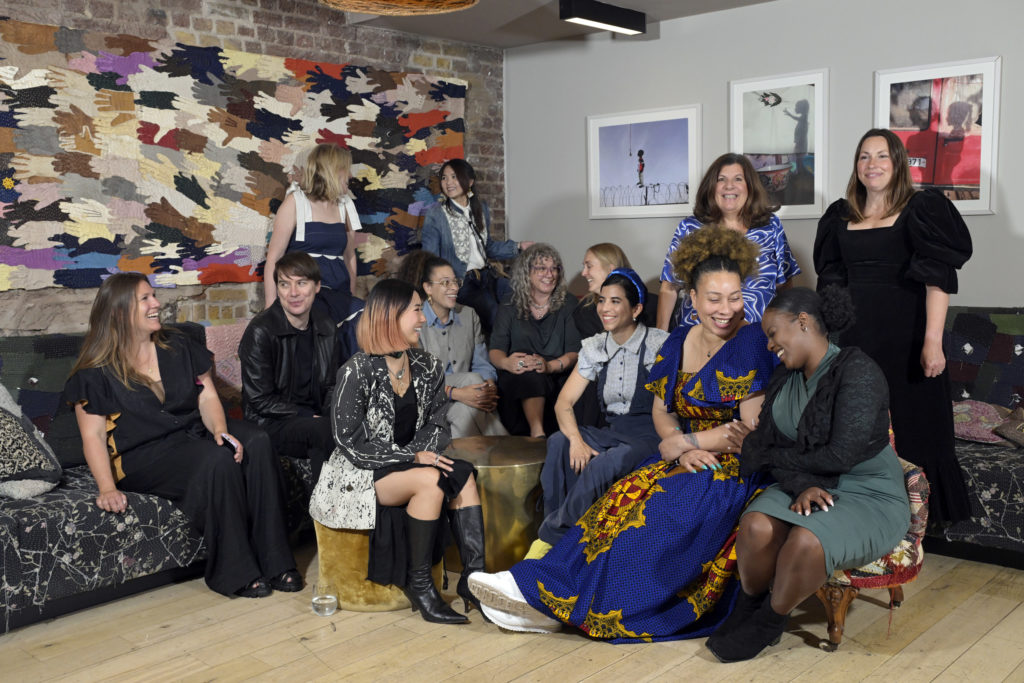
‘I want to say a big congratulations to our Evo designers—the first cohort to attend our Evo Fashion business programme—who are showcasing their outstanding products, garments, and accessories in the room tonight,’ says Helen Lax, Director of Fashion of District, onstage at the Manufacturing Futures 2024 Awards Supper. ‘The programme was designed to help businesses become more robust, focusing on all aspects of their operations, including finance, production, distribution, and product.’
Looking around the room at The Conduit, where mannequins draped in beautiful prints boldly catch the eye and rails displaying everything from chunky knitwear, summer dresses, and streetwear, to fun accessories, inclusive underwear, and luxury leather shoes are being perused by attendees, one can’t help but admire the wealth of talent showcased by the Evo Fashion designers. It’s not hard to feel optimistic about the future of the fashion industry with brands like these emerging.
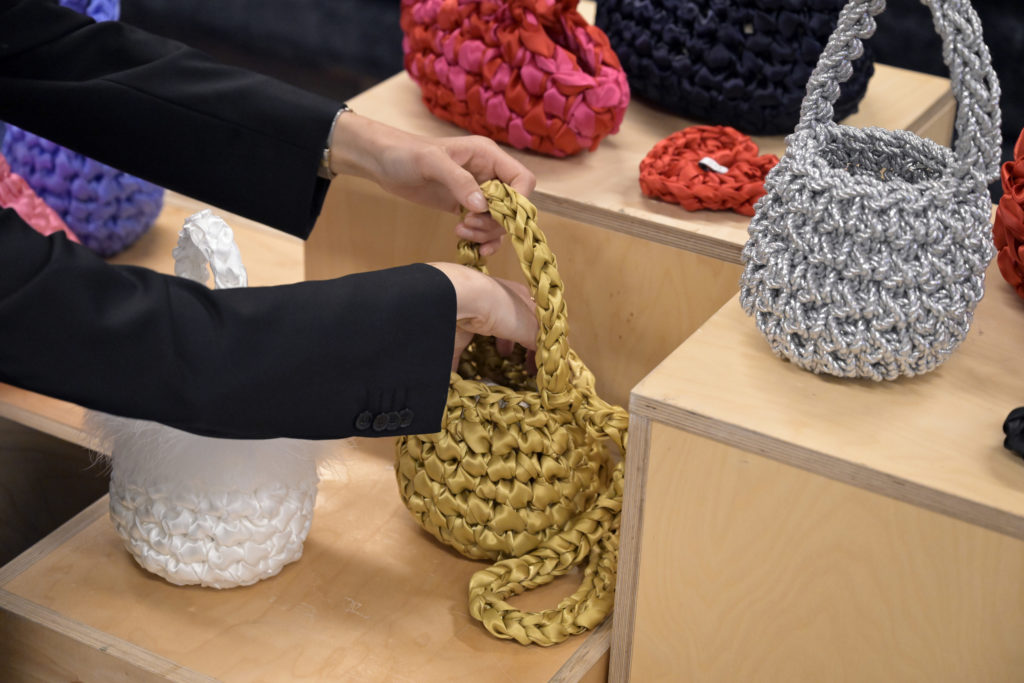
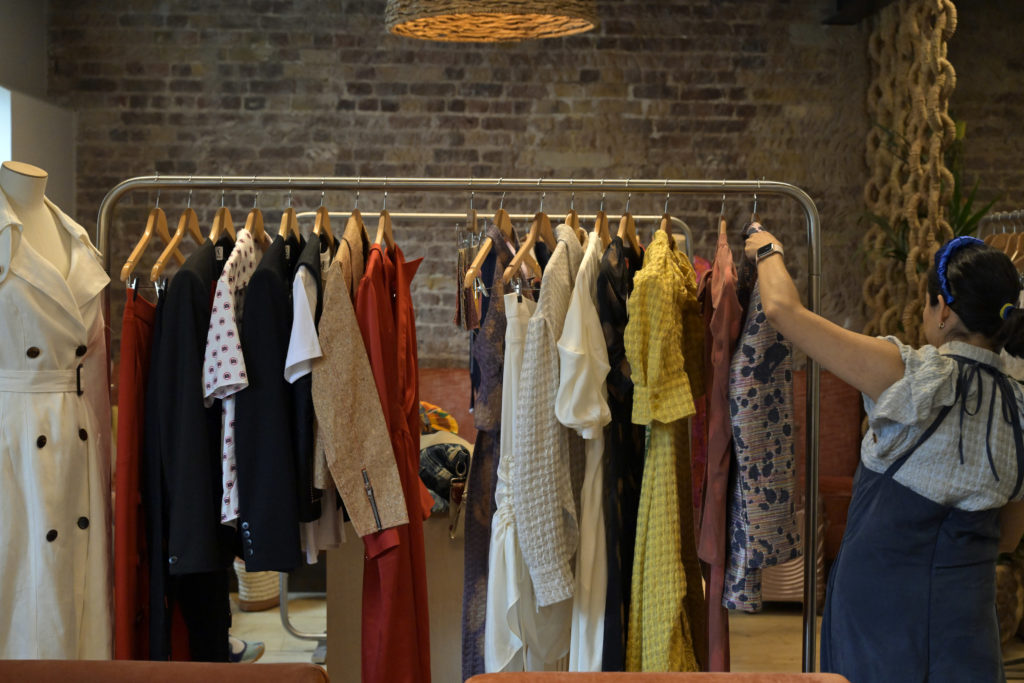
Delivered in partnership with Evo Learning, a training subsidiary of The Trampery, as part of London & Partners’ Early Stage Grow Programme funded by the UK Shared Prosperity Fund, Evo Fashion delivers an experiential programme for emerging brands that takes a holistic approach to business strategy, helping them drive growth while also integrating sustainability into every aspect of their businesses.
Designed to fit in with work commitments and delivered by experts, the programme consisted of a two-day intensive launchpad and four full-day masterclasses which focused on different aspects of learning, including environmental and social governance, exploring new business models, production and innovation, sustainable growth and investment, finance and business planning, and founder wellbeing, leadership and impactful teams. Peppered in amongst the sessions and masterclasses, there were panels and talks, tailored 1-2-1 mentoring, three peer-to-peer learning workshops, a creative photoshoot, and tonight’s presentation at Fashion District’s Manufacturing Futures 2024 Awards Supper to a room full of investors, brands, startups and innovators.
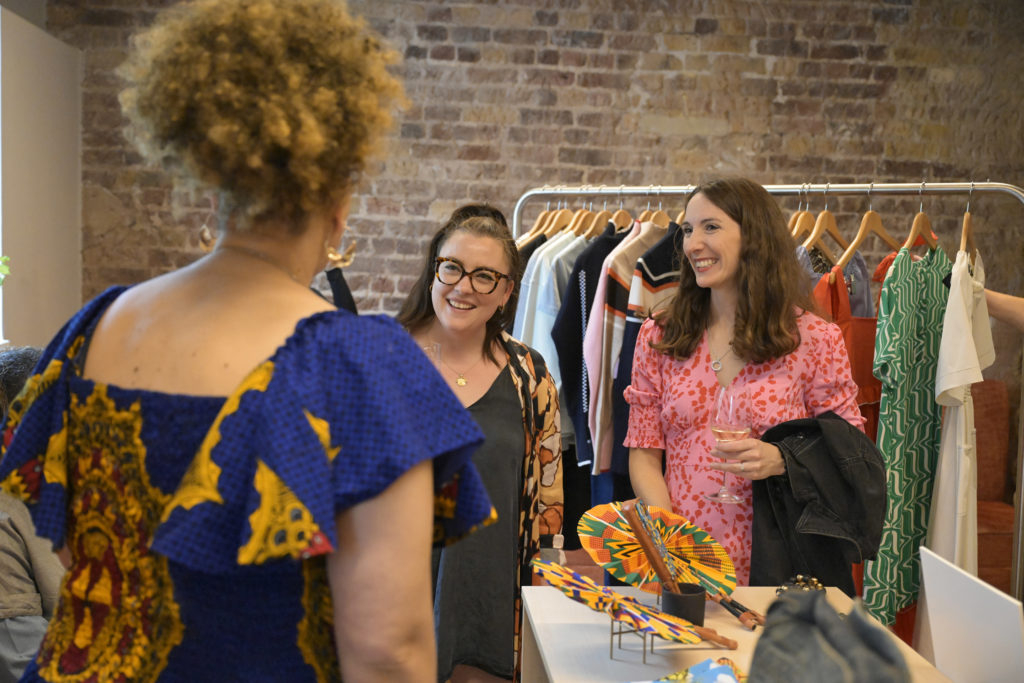
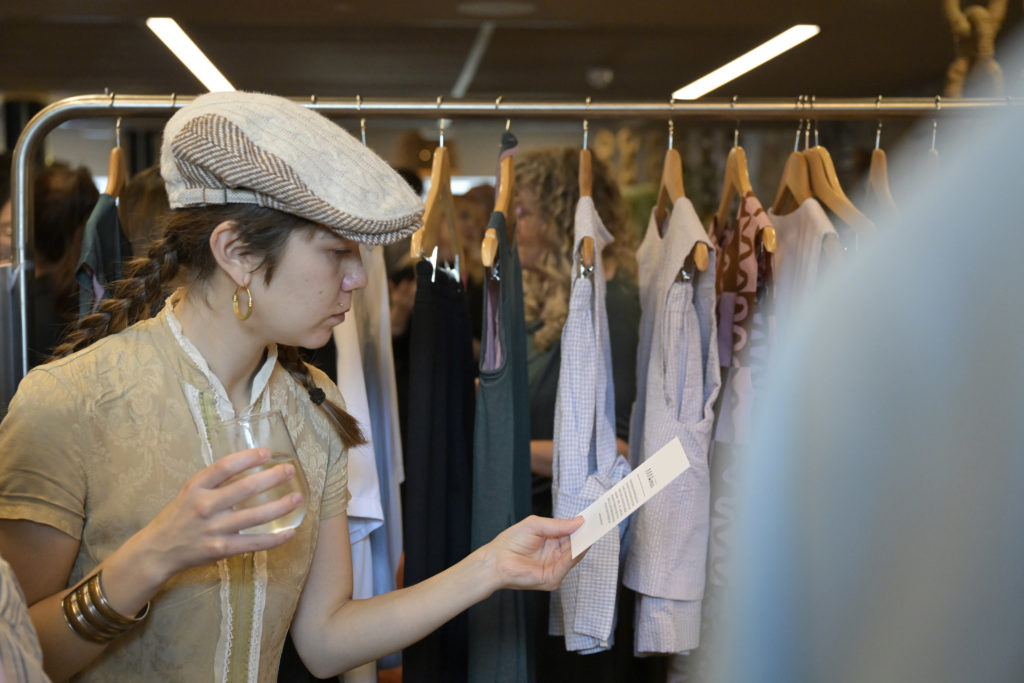
Selected by a stellar judging panel including Vanessa Podmore, Founder of Podmore Consulting; Yvie Hutton, Director of Design Relations and Membership at the British Fashion Council; Charles Armstrong, CEO of The Trampery, and Helen Lax, Director of Fashion District, our 15 participants were chosen based on their potential for business success and their commitment to integrating sustainability into their ventures.
The first Evo Fashion cohort included: Anciela, Asmuss, BEEN London, Clara Chu, Colèchi, Everyday Phenomenal, Fashion Meets Music, Isla de Gar, Kyle Ho, Mirla Beane, NEW STANDARD, OMNISS, Percy Langley, Pomi and Seeds, and ZERØ London.
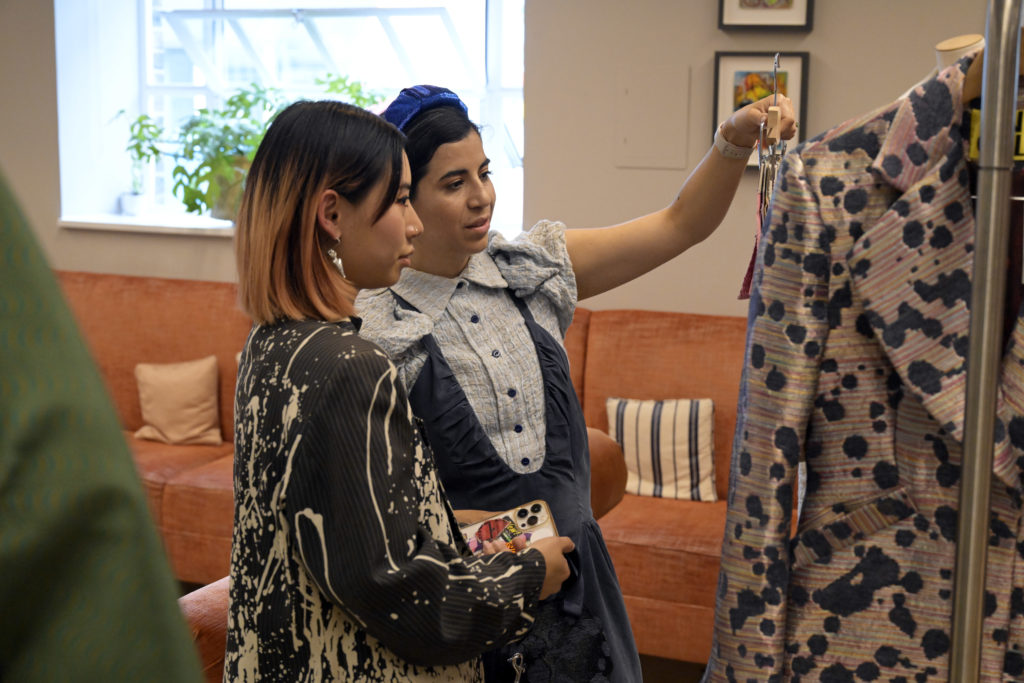
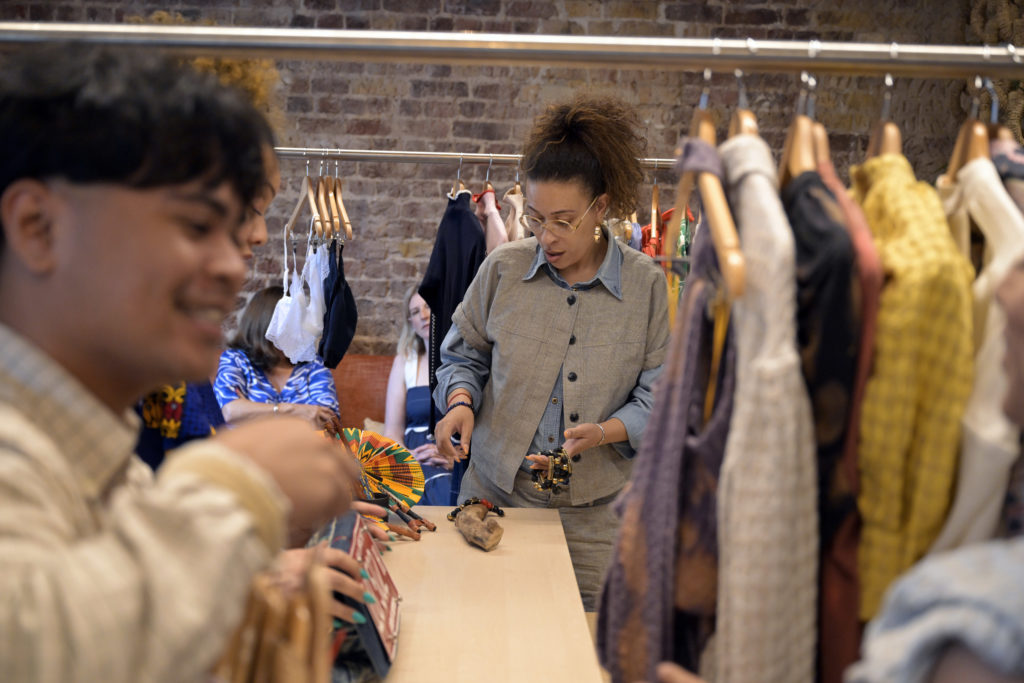
Speaking with Tukiya Mutupa, Founder of Pomi and Seeds, about the programme, she says, ‘I found the course really educational and practical. There aren’t a lot of programmes that help sustainability-focused fashion brands. This is the only one I’ve seen that’s fashion focused. I’ve been on learning programmes before that focused on wider business perspective development, but Evo Fashion was so comprehensive. We covered everything from manufacturing, materials, and product, to hearing from industry leaders and receiving tailored feedback in 1-2-1 sessions. It was amazing.’
Emma Garner, Founder of Isla De Gar, echoed this sentiment. ‘It’s been so valuable,’ she tells me. ‘I’ve been growing my brand organically, but I haven’t put any systems in place and that’s what this course has enabled me to realise. I come from a design background and started out as a designer and maker, so I didn’t really have any kind of goals or plans – I was just obsessed with bags! When I heard about Evo Fashion and its focus on business growth, finance, and sustainability, I realised it was the perfect fit for me. I liked that the programme offered tailored guidance with personalised 1-2-1 sessions and I found the marketing and financing days so useful. Those areas aren’t my forte, but I’ve now realised those are the things I need to hone in on.’
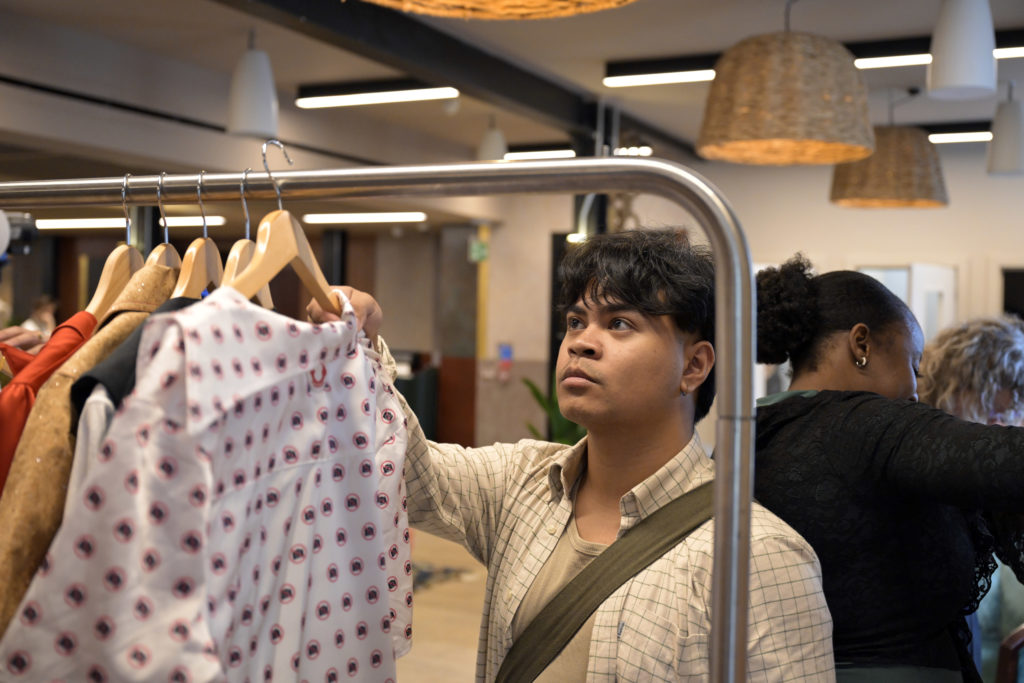
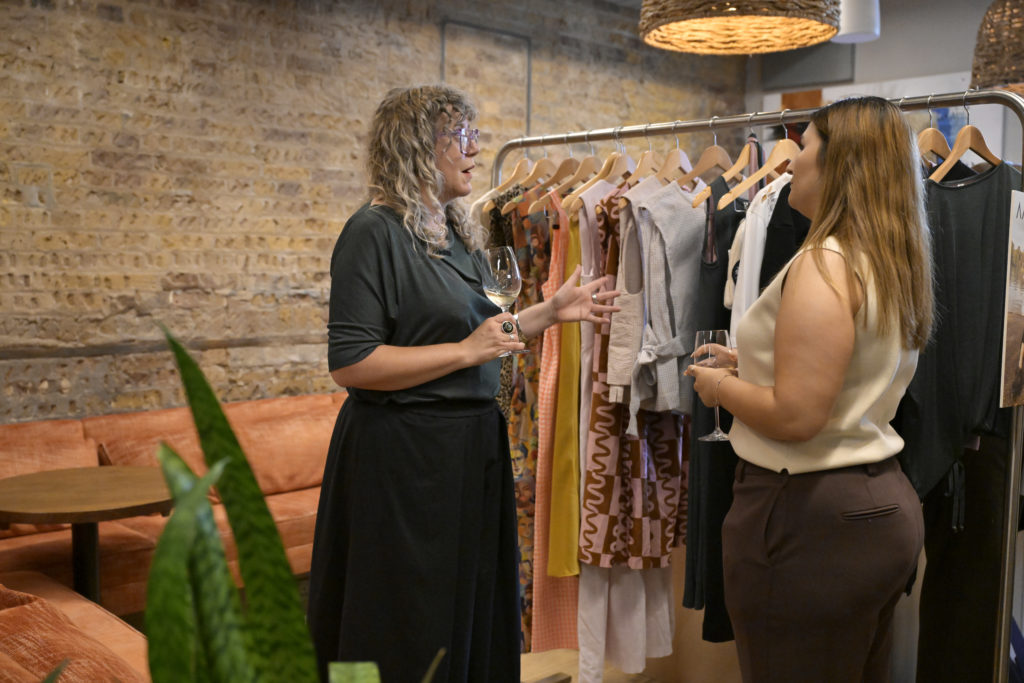
‘What we loved about the Evo Fashion programme was how holistic the content was,’ says Lizzy Lambie, Co-Founder of Fashion Meets Music. ‘There was a lot about personal wellbeing, and for us as a brand that’s really important. Hearing from bigger brands, for example Primark, was also useful. It’s interesting to hear from different kinds of brands and how they’re implementing sustainability into their businesses. We may be SMEs, but it all trickles down to us at the end of the day.’
Clara Chu, multidisciplinary artist and designer, says the course provided her with numerous insights. ‘We discussed the vision for our brands in Vanessa Podmore’s sustainability session, and I came away pondering how to make truly impactful change. After Stuart Balmer’s finance and investment session, I thought about how to keep my business afloat without going bankrupt. Emily Bingley’s marketing and communications session made me consider how to effectively communicate my brand’s message to the public. The course was well-rounded, bringing together various perspectives. Now, it’s time to follow their advice and take the next steps.’
We can’t wait to follow these fifteen brands’ journeys. Stay tuned to hear about Evo Fashion’s second cohort soon!
All images: Christian Sinibaldi
Stay up-to-date on our latest events and opportunities by following us on Instagram and LinkedIn:
- Instagram: @fd_ldn
- LinkedIn: Fashion District – London
Fibe wins Manufacturing Futures Innovation Challenge
Fashion District announced the winner and runner-ups of Manufacturing Futures 2024 at an Awards Evening hosted in The Conduit’s Ubuntu Lounge.
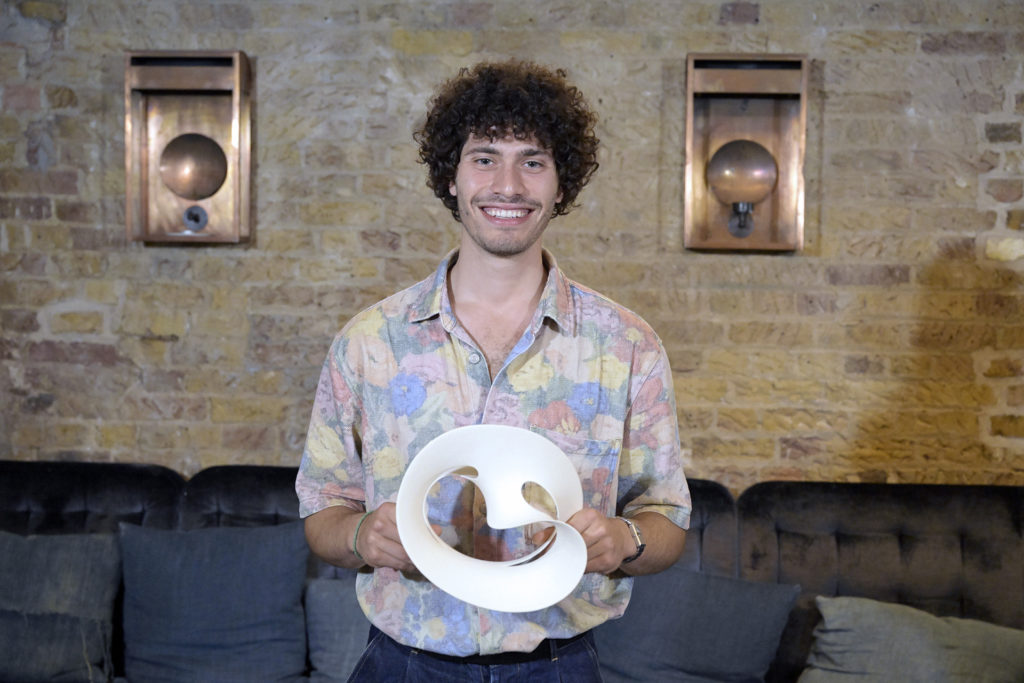
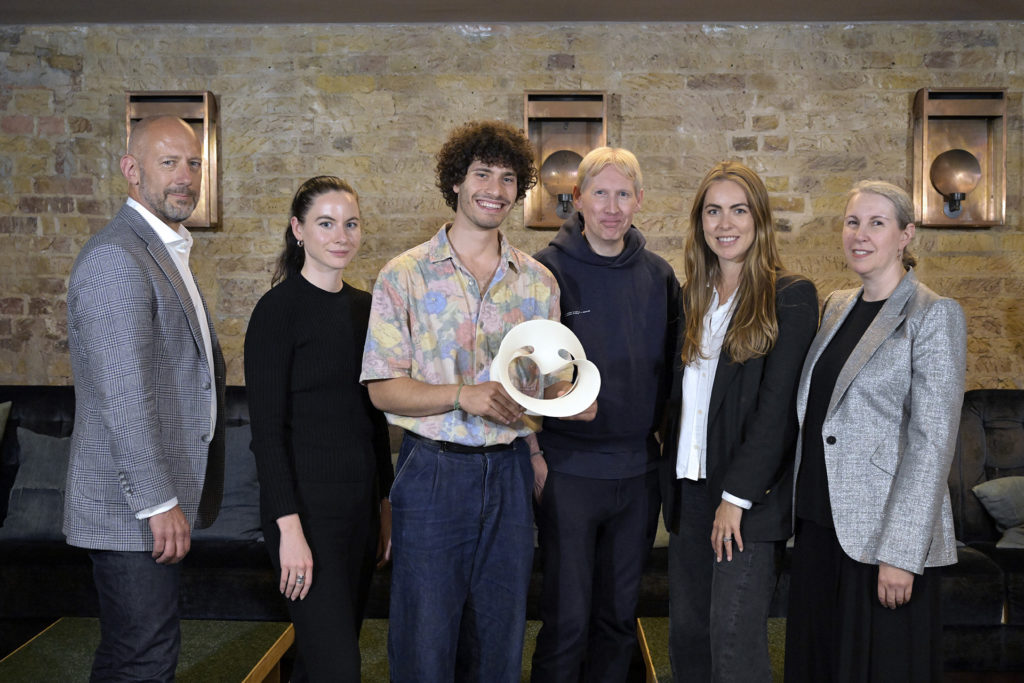
Fashion District has announced Fibe as the winner of its 2024 Manufacturing Futures Innovation Challenge. Fibe is a material science startup developing the world’s first textile fibres out of potato harvest waste. The company is developing the most scale, affordable and sustainable textile fibres with comparable performance to mainstream materials. They will receive £15,000 to advance their innovation and grow their business.
The winner was chosen by a judging panel of industry experts, including Ella Gould, Head of Sustainability and Innovation at Selfridges; Chelsea Franklin, Head of Advanced Concept Design at PANGAIA; Gillian Lipton, sustainability consultant most recently at Alexander McQueen; Matthew Drinkwater, Head of Fashion Innovation Agency at London College of Fashion, UAL; and Adam Mansell, CEO of UKFT.
Ella Gould, Head of Sustainability and Innovation at Selfridges and Manufacturing Futures judge, said:
“I feel so energised and hopeful after seeing such a broad spectrum of pitches solving problems across fashion’s entire value chain. The judges were unanimous in Fibe winning this year’s award. The energy in the room after their pitch was palpable and we so look forward to seeing them take their fiber innovation to the next level. Who knew potatoes were so exciting!”
Idan Gal-Shohet, co-founder of Fibe, commented:
“I’m really excited about winning the Manufacturing Futures prize. I’ve known many of the start-ups in this programme for a long time and have so much respect for them, which is why winning this prize means so much to us. The funding will be used to expand our business, so we are able to harvest a variety of different crops and create better conditions for farmers around the world. Our mission in the end is to create materials that use far fewer environmental resources than what’s currently available. Thank you so much to the judges and organisers for giving us this great opportunity to grow Fibe.”
The runners-up, who will each receive £5,000 for their business, include Sequinova, who are making biodegradable sequins out of cellulose; and Fab Materials, who are converting hard to recycle fashion waste into valuable boards and composites, such as furniture.
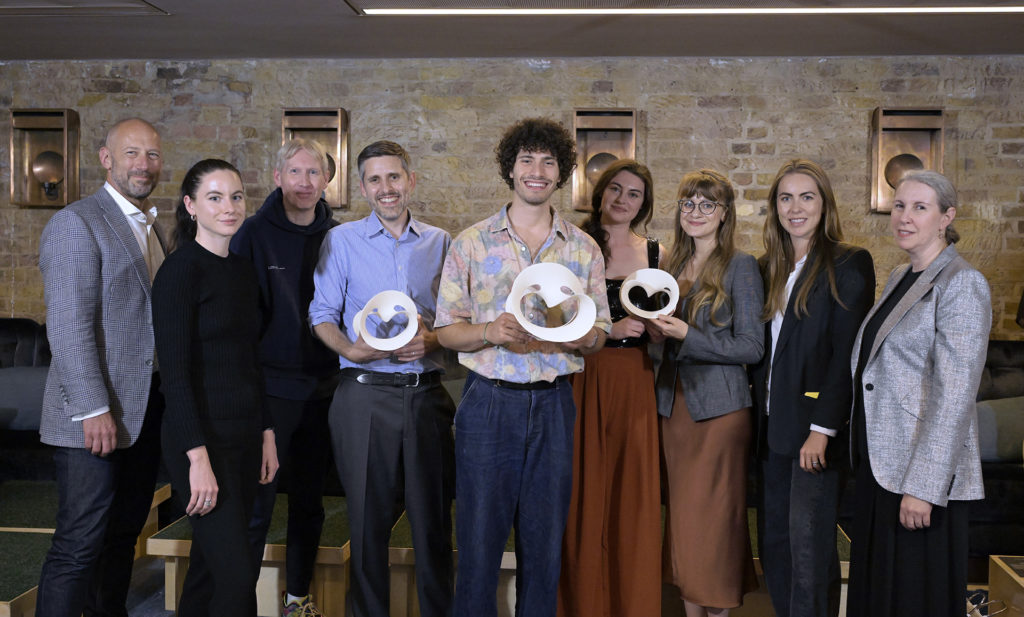
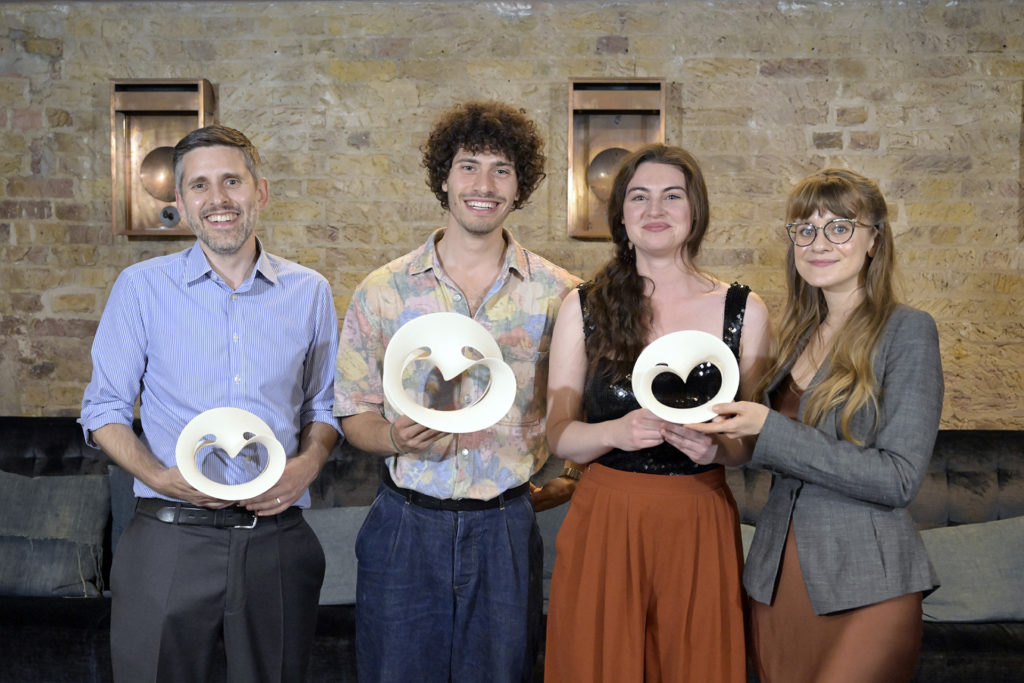
Helen Lax, Director of Fashion District commented:
“Congratulations to Fibe for winning this year’s Manufacturing Futures Innovation Challenge. I am thoroughly impressed by the talent and creativity of all the start-ups who took part in this year’s challenge and am hopeful for the future of the industry. There’s plenty we can do to improve and start-ups like these take us one step closer to achieving tangible change.”
The following brands were also part of the 2024 iteration of Manufacturing Futures: Innovation Challenge:
- Arda Biomaterials – turning spent grain from the beer brewing and whisky distilling industries into a novel, leather-like material
- Fiiba – scaling sustainable materials for the fashion industry made from 100% agricultural waste
- Oxford Biopigments – plant-based dyes that are naturally lightfast and perform like synthetic dyes
- PACT – creating performance and aesthetic ready textiles made from collagen sourced from industrial by-products
- The Seam – the wardrobe care & repair service powered by intelligent tech, that pairs specialist makers with people and brands to keep fashion out of landfill
- TRUSS – simplifying the resale process through instant access to actionable data
- Zori Tex – using the latest technology to optimise the sorting and availability of complex non-reusable textiles
We would like to thank The Conduit for hosting the Manufacturing Futures Innovation Challenge awards ceremony, and everyone that joined us to celebrate.
All images: Christian Sinibaldi
Stay up-to-date on our latest events and opportunities by following us on Instagram and LinkedIn:
- Instagram: @fd_ldn
- LinkedIn: Fashion District – London
Manufacturing Futures: Shortlist Announcement!
Fashion District has announced the shortlist of 10 start-ups and SMEs in its coveted Innovation Challenge: Manufacturing Futures programme.
As part of the programme, the brands have the chance to win a £15,000 cash prize to develop their sustainable manufacturing business to make an impact on the fashion industry, chosen by a judging panel of experts in July.
The shortlisted start-ups are:
- Arda Biomaterials – turning spent grain from the beer brewing and whisky distilling industries into a novel, leather-like material
- Fab Materials – converting hard to recycle fashion waste into valuable boards and composites
- Fibe – creating new cellulosic materials from potato harvest waste
- Fiiba – scaling sustainable materials for the fashion industry made from 100% agricultural waste
- Oxford Biopigments – plant-based dyes that are naturally lightfast and perform like synthetic dyes
- PACT – creating performance and aesthetic ready textiles made from collagen sourced from industrial by-products
- Sequinova – cutting-edge, plant based, biodegradable sequin materials
- The Seam – the wardrobe care & repair service powered by intelligent tech, that pairs specialist makers with people and brands to keep fashion out of landfill
- TRUSS – simplifying the resale process through instant access to actionable data
- Zori Tex – using the latest technology to optimise the sorting and availability of complex non-reusable textiles
Helen Lax, Fashion District Director said:
“It is incredible to be part of something that has the potential to change the way an industry works and make a real impact for future generations. The shortlist of brands in this iteration of Manufacturing Futures is spectacularly strong, and one can’t help but be amazed by the sheer talent and innovation held by the next gen of changemakers.”
The shortlist was chosen by the Manufacturing Futures judging panel, consisting of industry experts Ella Gould, Head of Sustainability and Innovation at Selfridges; Chelsea Franklin, Head of Advanced Concept Design at PANGAIA; Adam Mansell, CEO of UKFT, Gillian Lipton, Sustainability Director at Alexander McQueen; and Matthew Drinkwater, Head of Fashion Innovation Agency at London College of Fashion, UAL.
Winners from the previous Innovation Challenges include Lone Design Club, a platform where independent brands and conscious shoppers meet; Sparkbox, a retail planning and optimisation platform powered by machine learning; and Biophilica for their entirely plant-based, compostable leather alternative, Treekind.
Fashion District was founded in 2018 with a goal to bring together fashion, technology, business and education in east London to meet, compete, collaborate and innovate. Fashion District works with a number of different partners to facilitate support programmes helping to develop a strong, sustainable network within the UK fashion industry. Spearheaded by Director Helen Lax, Fashion District is supported by London College of Fashion, UAL, and the Mayor of London.
MEET THE SHORTLIST
Arda Biomaterials
Arda Biomaterials transforms globally abundant waste and co-product streams into scalable, animal, and plastic-free biomaterials. Arda’s first transformation is turning spent grain from the beer brewing and whisky distilling industries into a novel, leather-like material called New Grain, for use in fashion, automotive, and other sectors.
Fab Materials
Fab Materials are on a mission to deliver planet scale upcycling of the world’s post-consumer fashion waste. Our breakthrough solution addresses the 90M tonnes of clothing that’s sent to landfill or incinerated annually. We convert hard to recycle fashion waste into valuable boards and composites.
Fibe
Fibe is revolutionising the industry by engineering cutting-edge technology to extract cellulosic fibres from potato harvest waste. This untapped waste, which amounts to 150M tonnes annually and cannot be fed to livestock or compost, has the potential to provide 70% of global non-synthetic clothing demand. Our fibres use 99% less water, produce 82% less CO2e and require no land compared to cotton.
Fiiba
Fiiba is a next generation textile developer, scaling sustainable materials for the fashion industry made from 100% agricultural waste. Fiiba fibre has 1/10 the carbon footprint of conventional cotton and a 100% transparent supply chain. Fiiba raises low-income farmers out of poverty by paying for their waste and providing free organic fertiliser (a natural by-product of Fiiba’s innovation) that promotes long-term soil health.
Oxford Biopigments
Oxford Biopigments (OBP) mission is to solve key problems associated with sustainable textile dyeing. To this end we have developed a world first in plant-based, sustainable dyes: naturally lightfast dye molecules, modified to work without additional binding agents, that are easily blended to generate new colours and are compatible with existing dyeing machinery. Crucially, our dyes have equivalent technical performance to modern synthetic dyes without the harmful environmental impact.
PACT
PACT designs elegant biomaterials made in harmony with the planet Earth. We’re committed to helping the world’s most innovative companies dream without boundaries. Our first biomaterial Oval is inspired by generations of leather artisans and master craftspeople, Oval is a supple material made from collagen sourced from industrial by-products. It’s a highly scalable material that offers designers unparalleled flexibility whilst minimising environmental impacts across the entire production process.
Sequinova
Sequinova is a pioneering biomaterials company, revolutionising the textiles industry with cutting-edge biodegradable sequin materials. Plant-based, non-toxic, and available in a variety of colours and effects, we’ve partnered with the world’s leading manufacturers in Europe and Asia to deliver production-ready eco textiles at scale.
The Seam
The Seam delivers wardrobe care & repair at scale, pairing local, specialist Makers with people and brands to keep fashion out of landfill, and in the loop. The Seam is the fastest growing care and repair service in the UK powered by intelligent tech. Their network of specialists includes tailors, cobblers, leather restorers, knitwear menders, skewer cleaners, embroidery artists and so much more.
TRUSS
TRUSS is a London-based fashion technology SME focused on enhancing the second-hand fashion market through AI solutions and in-depth research. TRUSS aims to simplify the resale process through instant access to actionable data, removing the need for online research and manual data entry, while prioritising information and narratives.
Zori Tex
Zori Tex is a climate tech start-up on a mission to drive circularity in the hugely resource intensive fashion and textiles industry through innovative AI-powered technologies – combining machine vision and the latest deep learning networks to optimise the sorting and availability of complex non-reusable feedstocks, ready for closed loop recycling.
This year’s Manufacturing Futures prize will include:
- Cash prize of £15,000 for the winner and £5,000 each for two runners-up
- Desk membership for a year at The Trampery workspace in Fish Island Village
- Membership to UKFT providing access to their annual programme of events and webinars, networking opportunities via their extensive pool of members and supporters, and the latest market insights
- Business membership for a year to Common Objective, accessing 30,000+ global connections, premium intelligence and training courses in sustainable fashion and manufacturing
- The runners up will also receive professional memberships to Common Objective
- Business development consultancy hours from PANGAIA
Stay up-to-date on our latest opportunities by following us on Instagram and LinkedIn:
- Instagram: @fd_ldn
- LinkedIn: Fashion District – London
Inside the Launch of Manufacturing Futures 2024
Last week we celebrated the launch of Manufacturing Futures 2024 at a sold-out event at The Trampery.
Marking Fashion District’s sixth innovation challenge, this year the focus is on technological innovations and sustainable solutions that are solving any of the complex fashion manufacturing challenges facing the industry. Helen Lax, Director of Fashion District, described the event as a gathering of individuals that share ‘the same ethos, values and ideas for the future of fashion and sustainability.’
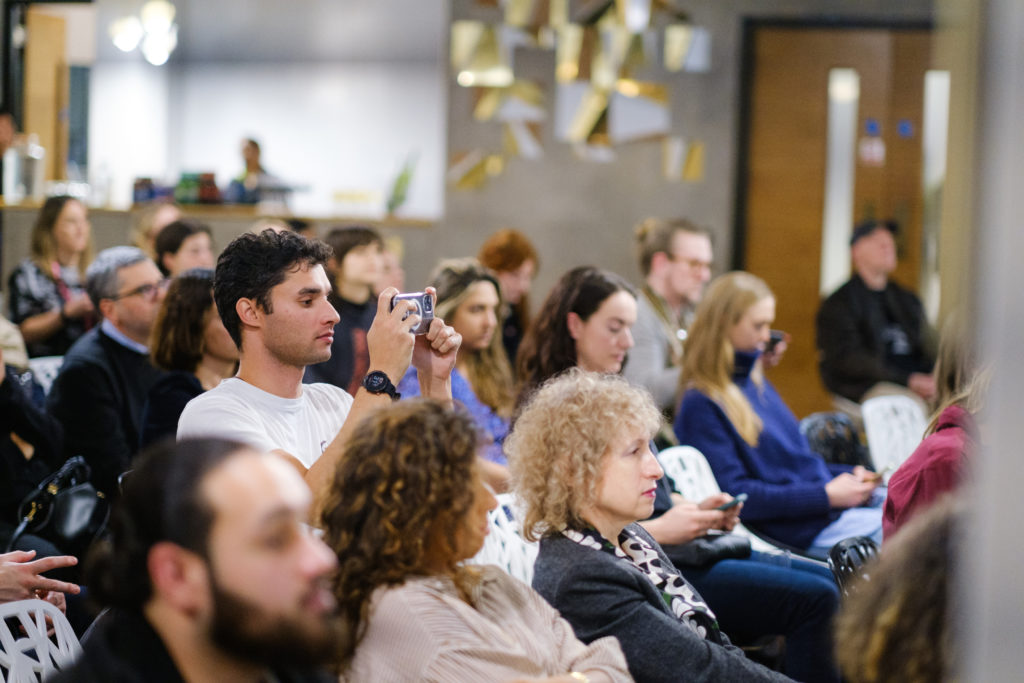
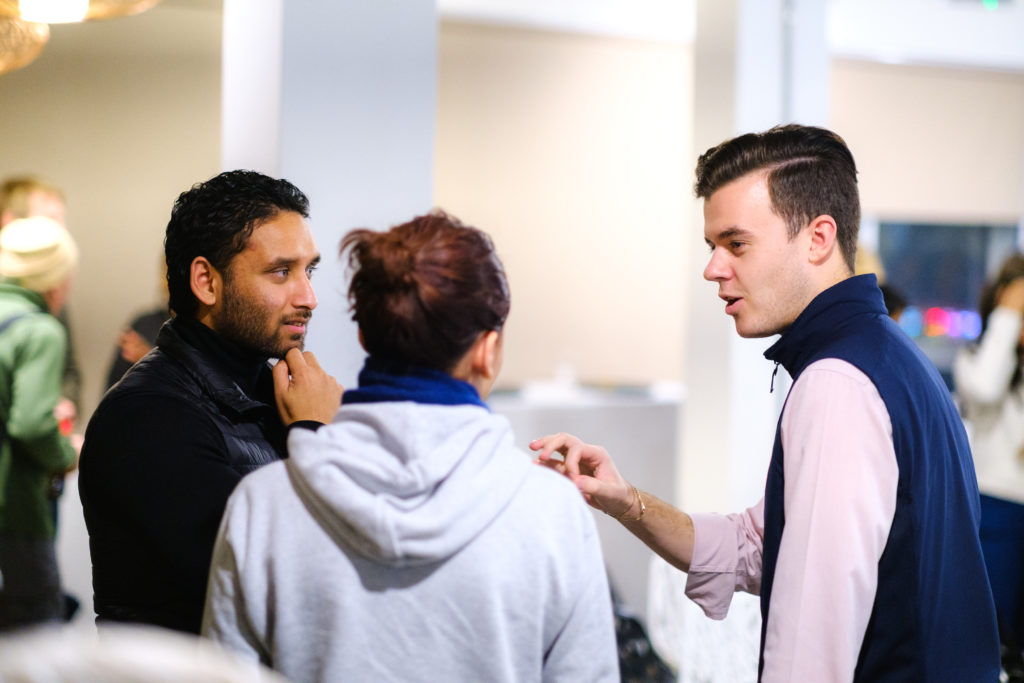
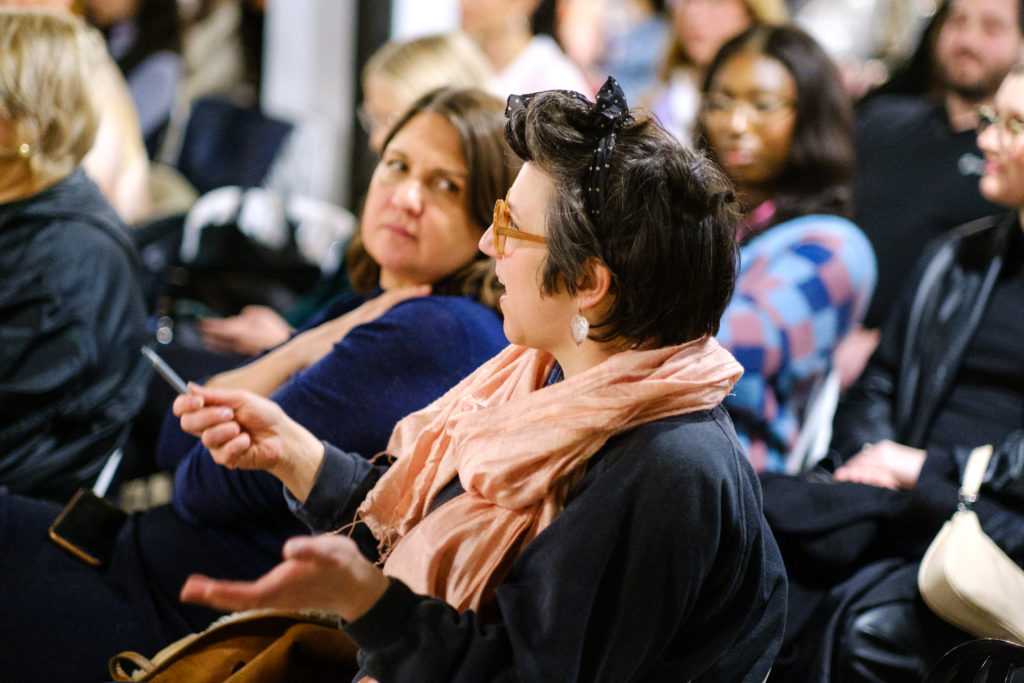
GANNI: Fabrics of the Future
Kicking off the event was keynote speaker Lauren Bartley, Chief Sustainability Officer at GANNI, who gave insight into GANNI’s strategy and how they work with innovation. ‘GANNI has a very very ambitious goal to reduce its carbon emissions by 50% by 2027,’ Lauren said. ‘The materials we use account for 50% of our carbon impact, making this our primary window of opportunity. It’s also where Ganni should focus as materials represent one of our most significant decarbonisation levers.’
Lauren also highlighted GANNI’s Fabrics of the Future initiative. ‘Fabrics of the Future is an internal research and development hub that scans the market for fabrics that will change the industry. At this point we’re working with thirty different material creators that have solutions or new innovations for materials. By 2025 the goal is that 10% of our materials should be coming from fabrics of the future.’
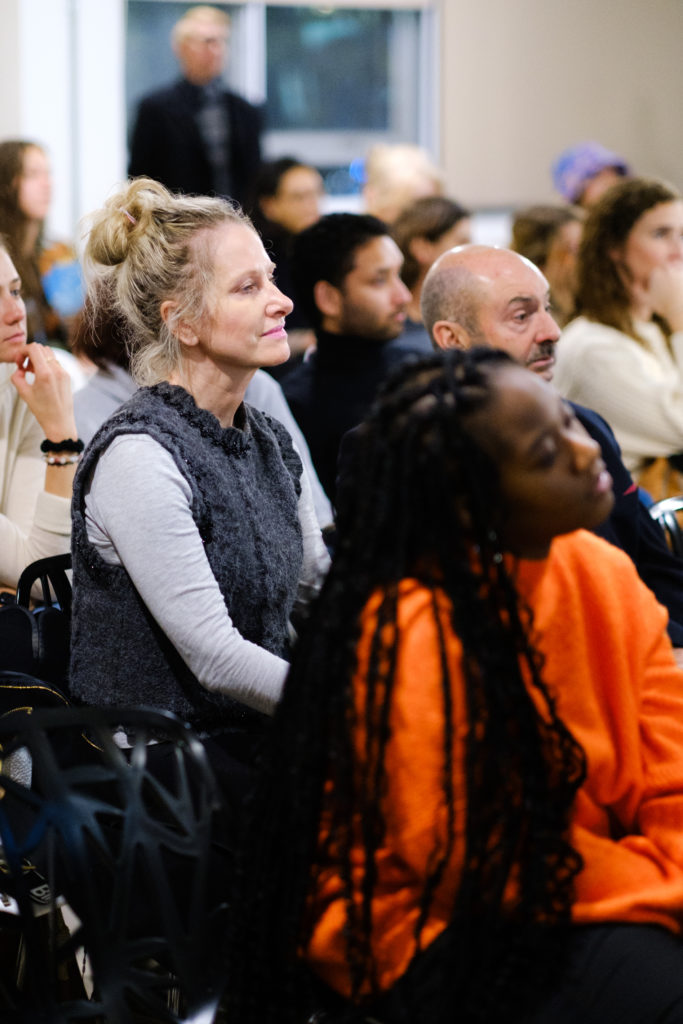
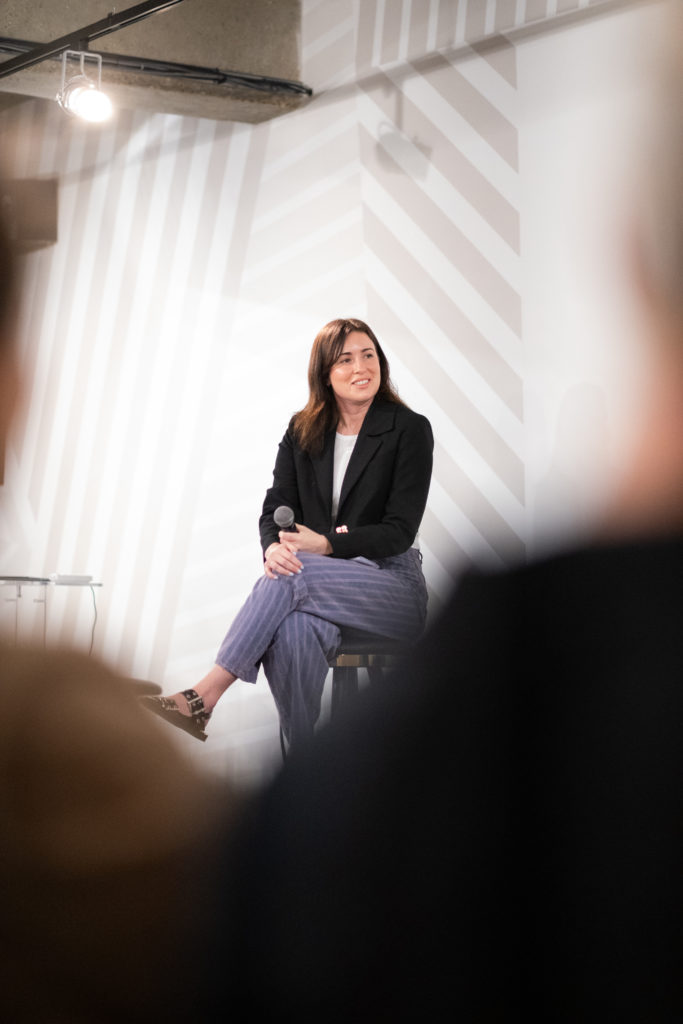
The Need for Partnership: Modern Synthesis x GANNI
One of the material creators GANNI have collaborated with is London-based biotech company Modern Synthesis. Lauren invited Jen Keane, CEO of Modern Synthesis, on stage to discuss their recent partnership.
Having developed a new class of biomaterials, Modern Synthesis works with bacteria to produce a type of non-woven textile that can be used to displace materials like leather, and in the future replace a wide variety of coated textiles. Modern Synthesis partnered with GANNI to reimagine their staple Bou Bag in their new innovative bacterial nanocellulose material. The handbag was unveiled at the London Design Festival 2023.
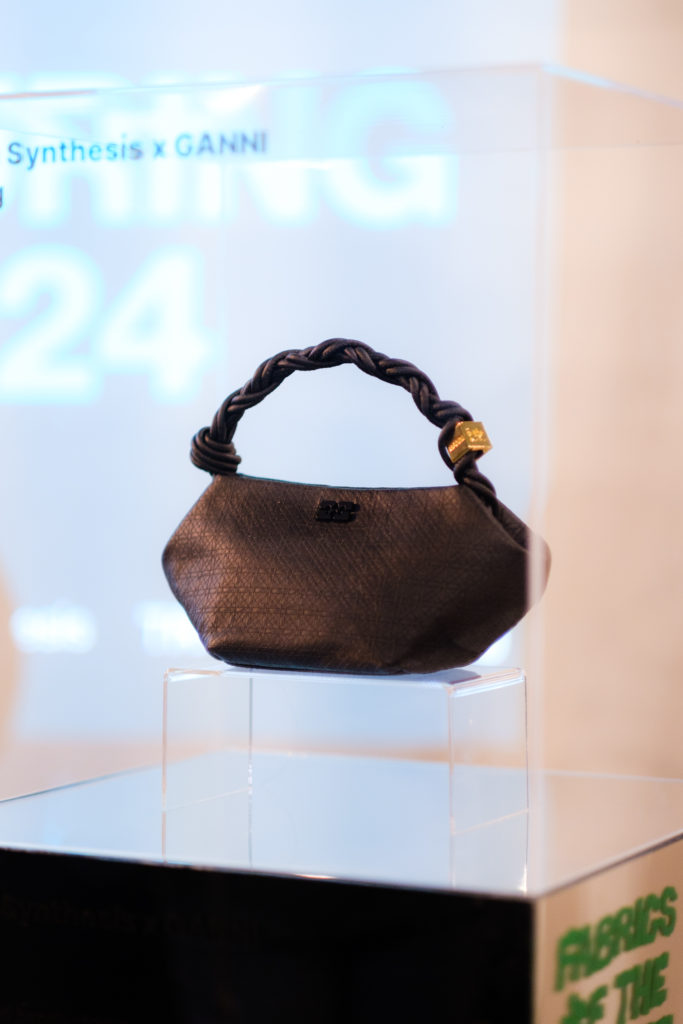
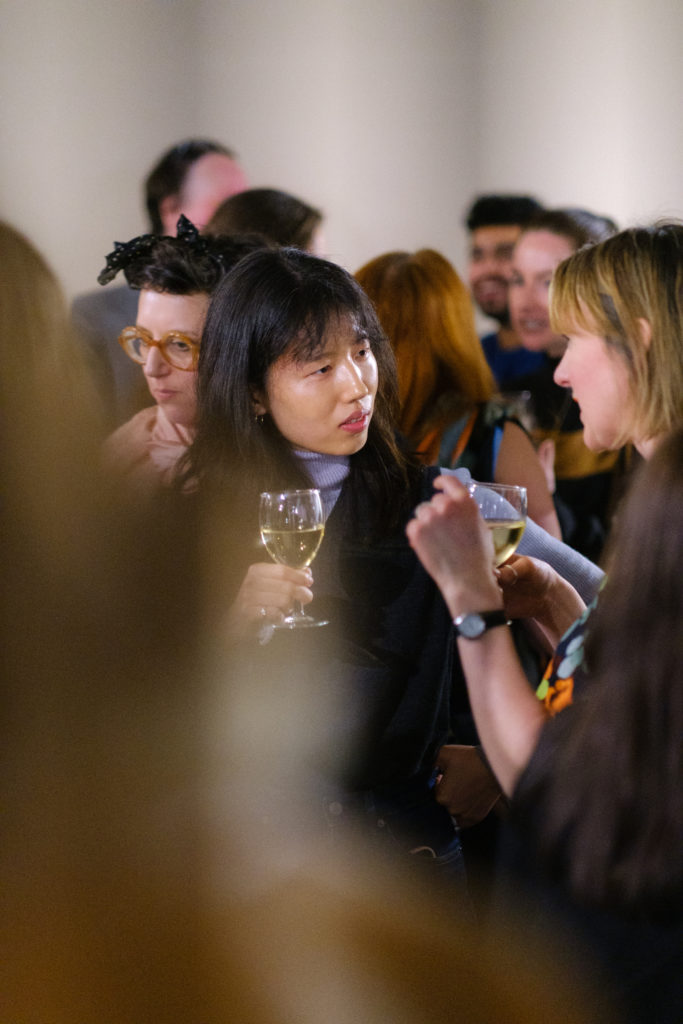
Explaining why Modern Synthesis reached out to GANNI to propose a potential collaboration, Jen said, ‘As a startup that makes materials, we can’t do it all. We need to actually make the impact that we want to drive and so we have to get it into a product. We need brands and partners across the whole supply chain to make that possible. We contacted GANNI because they have such a strong perspective in this space and actually take action. Very few brands have innovation departments.’
Lauren rounded up the conversation by saying: ‘I hope that what you’ll take away from our talk today is that GANNI relies heavily on innovations like Modern Synthesis to meet our sustainability goals, and vice versa. Jen needs brands like GANNI to secure investment and effectively implement these technologies. It’s important not to underestimate the value of partnership.’’
Offering one final tip to the audience Jen said, ‘Don’t give up! It’s hard but we’re gonna get there. My biggest advice is to collaborate as much as possible. You can’t do everything yourself. Figure out what you’re good at, what you’re not good at, and find friends to do the things you’re not good at.’
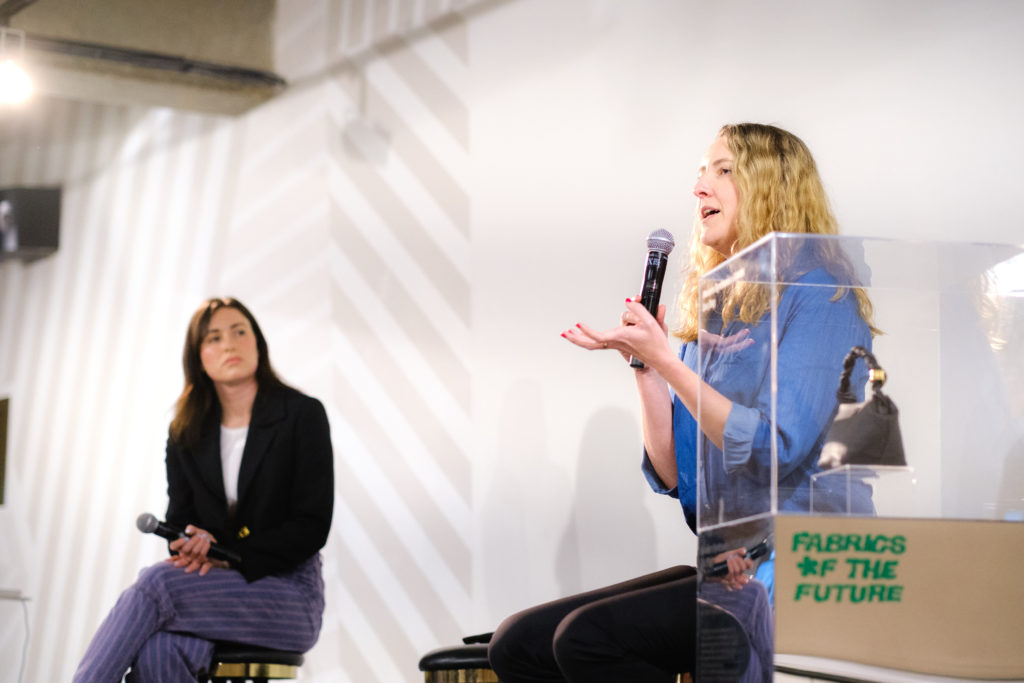
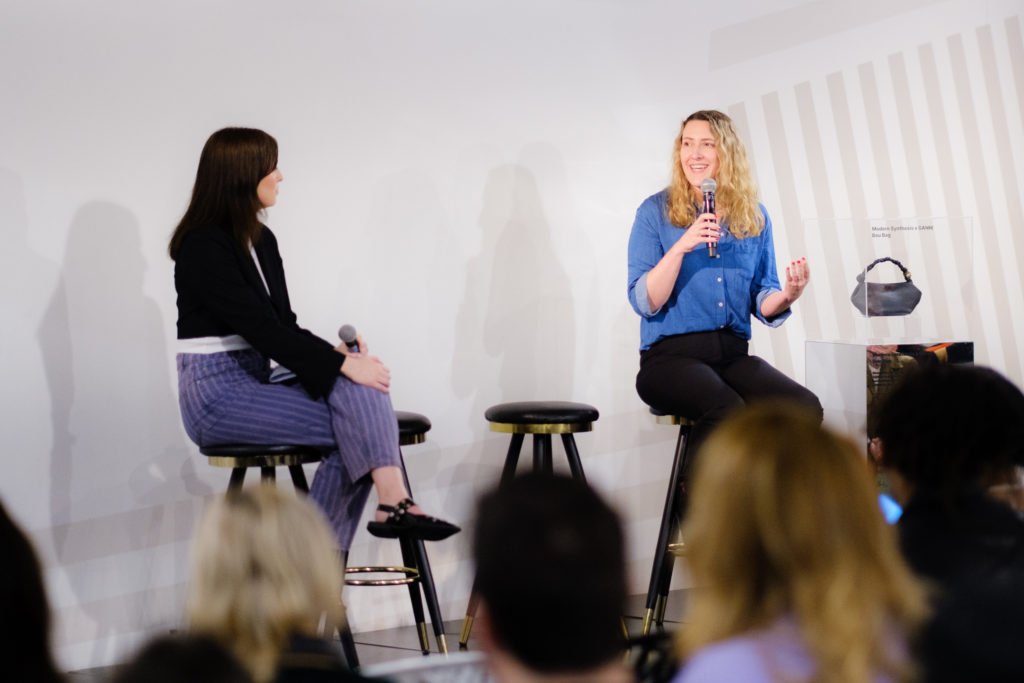
Introduction to Manufacturing Futures 2024
Helen Lax then took to the stage to introduce this year’s innovation challenge, Manufacturing Futures 2024. ‘This year, we’re seeking innovative ideas, businesses, and startups that can benefit the fashion industry by offering sustainable solutions for various aspects of the supply chain.’
To be eligible for the challenge, applicants must have a tech-based solution, be a registered business, and either be operating in the UK or have plans to pilot or operate in the UK. The winner will take home £15,000, as well as receiving business support from PANGAIA, one-year complimentary UKFT membership, one-year workspace membership at The Trampery and one-year platform membership from Common Objective. The runners-up will receive £5,000 each, one-year UKFT membership and one-year platform membership from Common Objective.
Finalists will attend a one-day event in May where high-level industry professionals will act as ‘critical friends’ to support and challenge their business proposition, and provide constructive feedback; as well as two Development Days focused around production and investment. Finalists will also be invited to join the celebratory Fashion District Innovation Awards and Investment Supper in July, attended by influential members of the fashion, tech and investment industry.
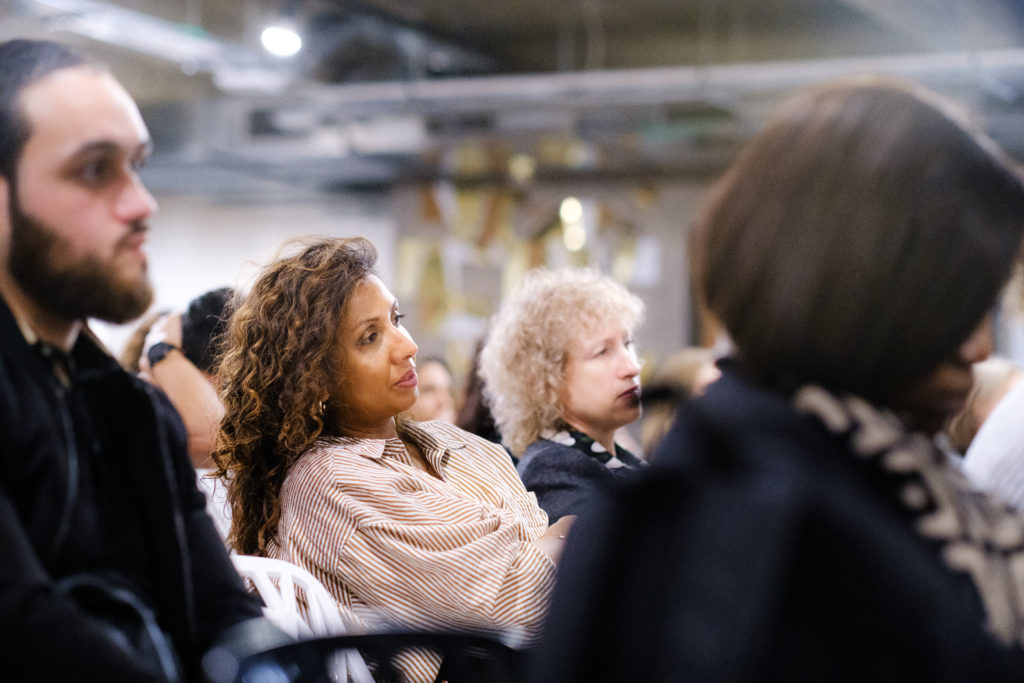
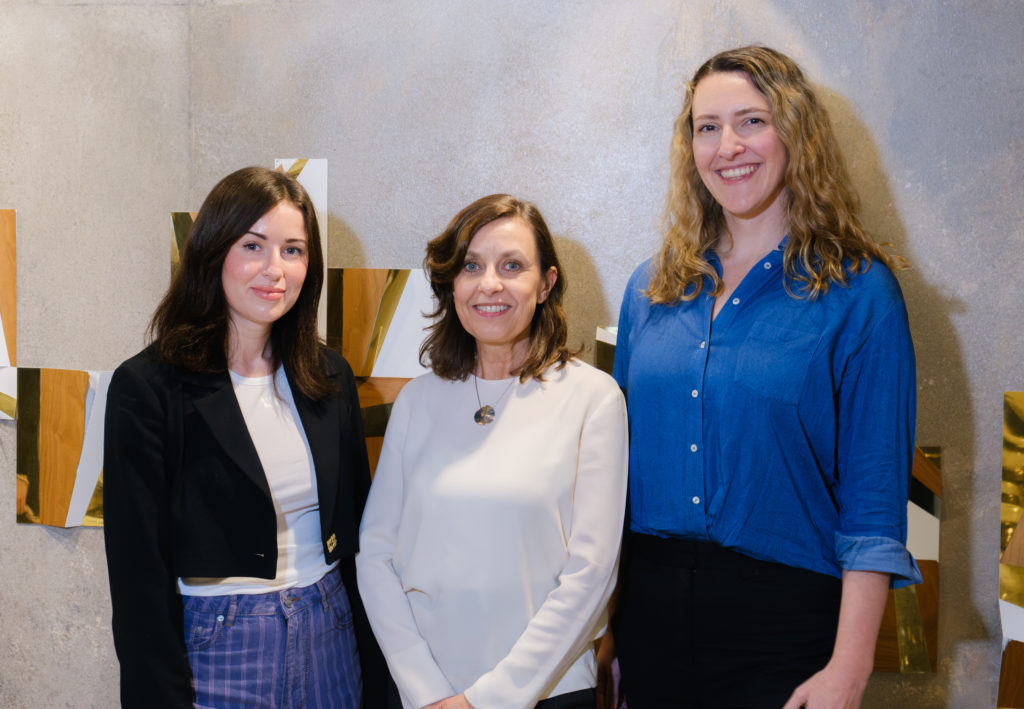
Meet The Judges
After running through the details of this year’s manufacturing challenge, it was time to hear from our incredible judging panel: Chelsea Franklin, Head of Advanced Concept Design, PANGAIA; Adam Mansell, CEO, UKFT; Gillian Lipton, Head of Sustainability, Alexander McQueen; Ella Gould, Head of Circularity and Innovation, Selfridges, and Matthew Drinkwater, Head of Fashion Innovation Agency, UAL: London College of Fashion.
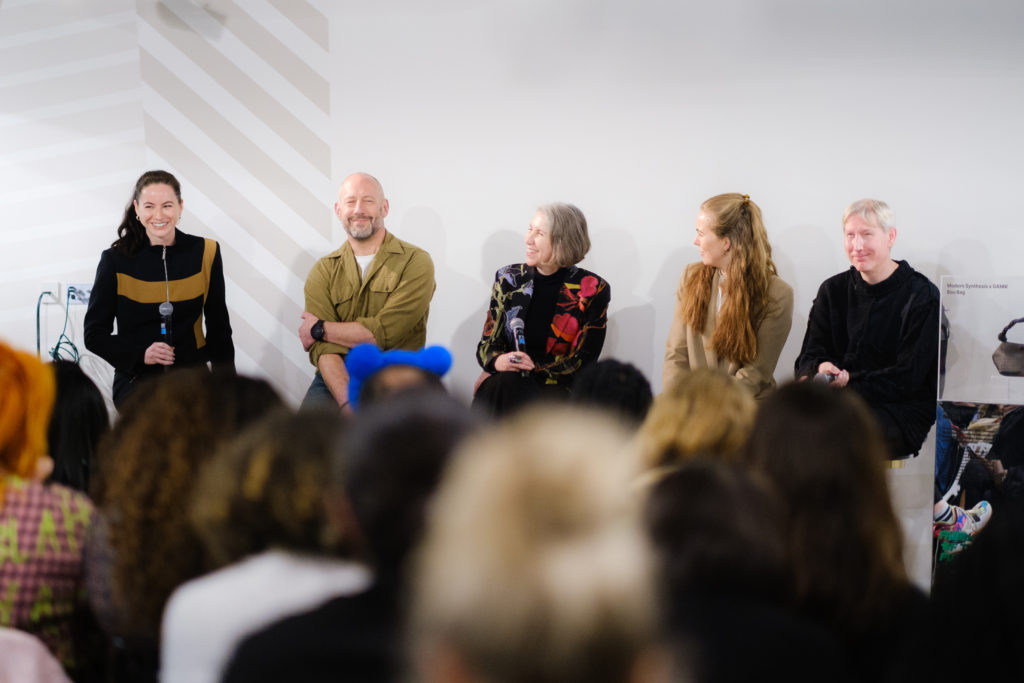
Discussing their criteria for the challenge, Matthew Drinkwater said, ‘Above all, I want to feel excitement for an application that I’m reading. It’s that magical moment…you want to transform the innovation into a real thing.’
Ella Gould added, ‘I’m always sceptical when someone comes to me with big tech and they only talk about the technology. Come to me with a problem, tell me the problem that you’re solving or why you’re doing something better. That for me is when the juices start flowing and I get really inspired.’
Gillian Lipton stressed the importance of time. ‘For me it’s all about finding a solution that is scalable, but also that I don’t have to wait too long for. I’m aware that things take time, in terms of innovation and new materials, but we don’t have time!’
Adam Mansell stated the biggest problem for him was volume. ‘I love new materials, new materials are fantastic, but if someone came up with a concept that would allow us to take all the cotton, polyester, and wool that we use, capture it, recycle it, get it manufactured in the UK, that gets my vote. You’d get lifetime membership to UKFT if you can solve that! But genuinely that’s where the problem is. That’s where the focus really needs to be.’
Chelsea Franklin urged applicants to consider the customer. ‘Functionality is obviously very important in terms of innovation performance, but also understanding how to convince a consumer to buy something, such as an alternative fabric – why? If the price is so much more significant, why should they purchase it? How do you tell that story? Build that narrative?’
The event concluded with key advice from the judges. Matthew Drinkwater advised applicants to think about clarity of message. ‘What problem are you solving? Answer all of those questions fully and critically, and you stand a really good chance of getting through.’
Chelsea Franklin echoed this. ‘Articulating your vision is a skill in itself. We want to know what problem you’re solving, problem solution framing, and why we should care. If you can answer that clearly and visually that’s my top tip.’
‘Don’t bring me something that’s been done five years ago,’ Adam said. ‘Do your homework. Do proper market research. Also read the application questions carefully and answer them clearly. Look at the finances bit, because it’s really important that you’re thinking beyond the initial. Think about what the future looks like, and don’t tell me that you’re going to be a billion pound turnover company in five years time. It’s hard work. It takes a lot of effort and collaboration and that should not be why you’re in this space, you should be in this space to solve a problem.’
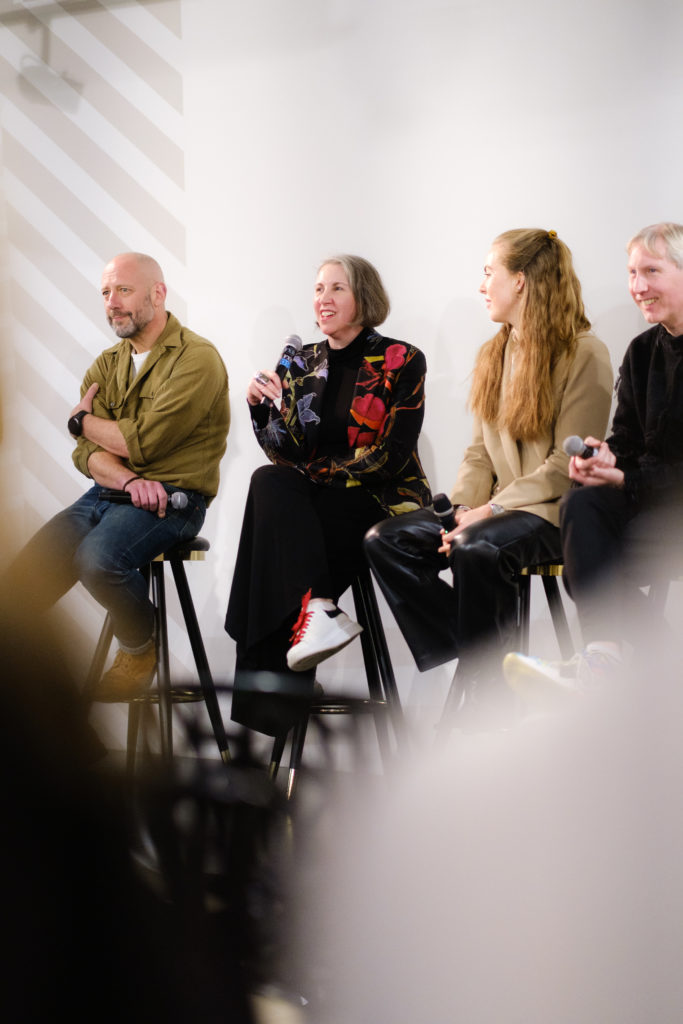
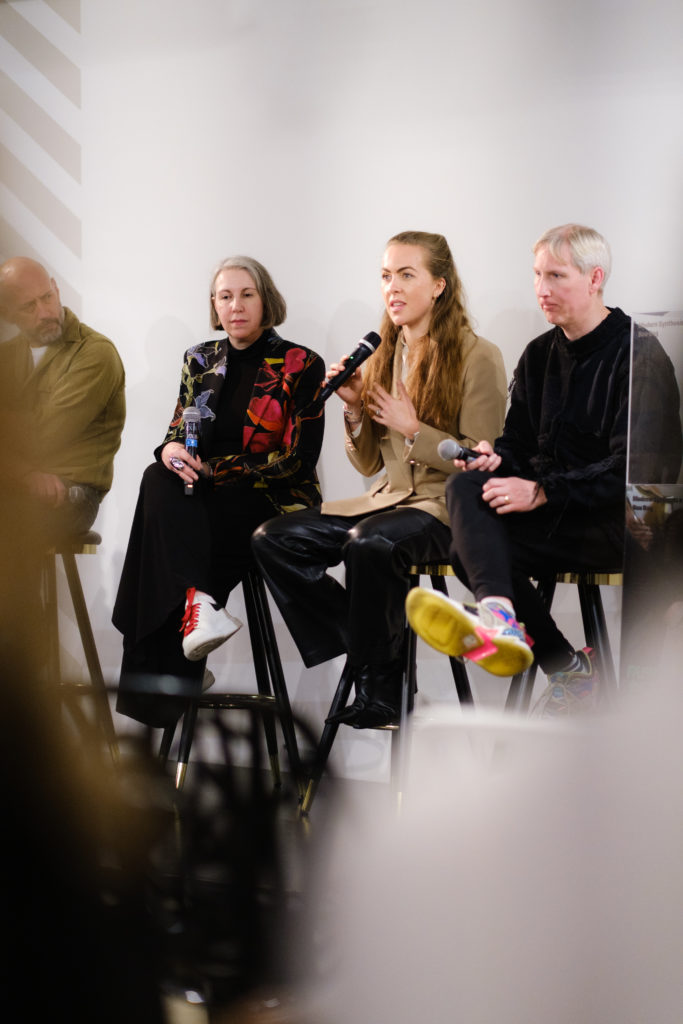
Do you think you’ve got what it takes to manufacture a new sustainable solution? Want to be in with a chance of winning £15,000? Applications for Manufacturing Futures 2024 are now open!
Follow us on Instagram, LinkedIn, Facebook and Twitter to stay update-to-date on our latest events and opportunities:
- Instagram: @fd_ldn
- LinkedIn: Fashion District – London
- Facebook: Fashion District London
- Twitter: @fd_ldn

Come to the launch of our new Innovation Challenge: Manufacturing Futures 2024
Thursday 8 Feb | 18:00 – 20:30
The Ballroom, The Trampery, 239 Old Street, London, EC1V 9EY
We’re delighted to announce the launch of our next innovation challenge Manufacturing Futures 2024, hosted in partnership with The Trampery, a purpose-led enterprise providing workspace, training and management for London’s trailblazing businesses. Join us on 8th February to find out more about next year’s challenge, hear from leading figures in fashion sustainability, and network with London’s fashion, tech and innovation communities.
To help us launch the challenge, we’ll be hearing from Lauren Bartley, Chief Sustainability Officer at GANNI and Jen Keane, CEO of Modern Synthesis, one of our Manufacturing Futures 2021 winners. Lauren will present a keynote on embedding innovative sustainable solutions into a large brand, followed by a discussion with Jen about how the GANNI x Modern Synthesis partnership came about.
Afterwards, we’ll launch next year’s challenge brief, followed by a ‘meet the judges’ panel, where attendees will get the opportunity to learn more about our judges and find out their criteria for selecting the winners. The evening will conclude with networking, drinks and nibbles.
Agenda:
- 6:00pm – Drinks and canapés
- 6:30pm – Welcome and intro by Helen Lax, Director of Fashion District
- 6:35pm – Keynote speech with Lauren Bartley (GANNI) and Jen Keane (Modern Synthesis)
- 7:05pm – Introduction to Manufacturing Futures 2024
- 7:20pm – Meet the Judges
- 7:35pm – Q&A
- 7:45pm – Wrap up and close
- 7:50pm – Networking and drinks
About The Challenge
Fashion District’s annual Innovation Challenges are designed to find solutions to current industry issues, while supporting new innovations and SMEs. Next year, we’re running our second ‘Manufacturing Futures’ challenge, to support technological innovations and sustainable solutions which are solving any of the complex fashion manufacturing challenges facing the industry. This could include anything from:
- Materials innovation
- Digital innovation
- Manufacturing processes
- Waste management
- Supply-chain and logistics
- Transparency and traceability
- Circular economy
- End-of-use
We also seek to encourage tech solutions, perhaps from other sectors, that could be applied to fashion manufacturing and create interdisciplinary connections between technologists and engineers, and fashion creatives and manufacturers.
Applicants will be in with the chance of winning cash prizes, business support, and the opportunity to pitch to some of the industry’s leading brands and innovators.
MEET OUR JUDGES
Manufacturing Futures 2024 brings together high-profile fashion, technology and sustainability experts committed to supporting the next wave of innovation. Come along to the launch to hear from our esteemed judging panel, including:
- UKFT (Adam Mansell, CEO)
- Selfridges (Ella Gould, Head of Sustainability and Innovation)
- Alexander McQueen (Gillian Lipton, Sustainability Director)
- Fashion Innovation Agency (Matthew Drinkwater, Head of FIA at UAL: London College of Fashion)
- PANGAIA (Chelsea Franklin, Head of Advanced Concept Design)
Follow us on Instagram, LinkedIn, Facebook and Twitter to receive updates about this exciting event!
- Instagram: @fd_ldn
- Facebook: Fashion District London
- LinkedIn: Fashion District – London
- Twitter: @fd_ldn

Design Futures 2022: Critical Friends Day
As part of the final stages of the Design Futures 2022 challenge, our shortlisted designers had the privilege of presenting their innovations to industry experts at our ‘Critical Friends Day.’ The day provided the finalists with the rare opportunity to receive critical feedback from specialists in various sectors to ensure their design concept is foolproof ahead of their final presentation to the judges.
What?
Each shortlisted designer had the opportunity to sit down with five different Critical Friends panels including: Business Planning, Marketing, Design Innovation, Production + Sourcing, and Use Phase + End of Life. The designers took the first few minutes to introduce and explain their concept in detail. Afterwards, the Critical Friends critiqued the proposed design innovation and gave feedback from the perspective of their specialist area.
Why?
This part of the challenge is designed specifically to support our shortlist in the lead up to the final presentations, where they will showcase their design innovation and pitch to win. To be in with the best chance of winning, the panels were aligned to the key points of the Design Futures criteria so that the designers could develop their propositions using constructive feedback.
Who?
The Critical Friends have been selected for their expertise and experience across specialist areas, ensuring that the designers get well-rounded feedback in each session.
Read on below to see the full list of experts that took part.
BUSINESS PLANNING
Alan Hunt – Head of Intellectual Property, Lewis Silkin
Tom Gaunt – Co-Founder of The Collective and Deputy Co-Head of Media and Entertainment Group, Lewis Silkin
Stuart Balmer – Principal of Financial Planning, Balmer Financial Planning
Sally Denton – Editor and Founder, HRE AFTA
MARKETING
Mafalda Oliveira – Business Engagement Lead, ReLondon
Emily Gordon-Smith – Content Director and Sustainability Lead, Stylus
Jen Charon – Co-Founder, LOANHOOD
DESIGN INNOVATION
Dagmar Grote – Partnership Manager, Fashion for Good
Marilyn Martinez – Project Manager, Ellen MacArthur Foundation
Chelsea Franklin – Senior Concept Designer, PANGAIA
PRODUCTION + SOURCING
Blake Sturgess – Senior Manager, Product Operations, PANGAIA
Andrew Yip – Head of Materials and Process Innovation, PANGAIA
Mikha Mekler – Lecturer in production manager, Ex-Head of Production at Raeburn
USE PHASE / END OF LIFE
Anastasia Grenkova – Sustainability Manager, Oxwash
Rory Hugill – Materials Impact Manager, PANGAIA
Layla Sargent – Founder and CEO, The Seam
We would like to extend our thanks and gratitude to all of the industry experts that provided invaluable feedback during the Critical Friends Day. We can’t wait to see the results at the final presentations in November.
Stay tuned for more Design Futures 2022 updates by following us on our social channels, or why not sign up to our much-loved monthly newsletter?
- Instagram: @fd_ldn
- LinkedIn: Fashion District – London
- Facebook: Fashion District London
- Twitter: @fd_ldn
Design Futures Finalists Announced: Meet the designers advancing circular fashion in 2022
The Fashion District, in collaboration with London College of Fashion, UAL, is pleased to announce the shortlist of nine designers that could revolutionise the fashion industry.
Design Futures 2022 calls upon sustainably-driven designers and businesses to present new design solutions to prevent premature disposal, and extend the usage of products to help make a positive impact on the planet. It is focused on designers who are developing propositions for longevity, zero waste design, designing with waste, material cyclability, and regeneration.
Shortlisted designers are competing to win a cash prize of £15,000, donated by PANGAIA, one of the leading material science companies dedicated to tackling the climate crisis. The winner will also receive a development workshop with PANGAIA, plus ten consultancy hours with the company. The Trampery Fish Island Village will provide a one-year desk membership, alongside the Business of Fashion who is offering complementary professional membership, and Common Objective who will be providing a 12-month business membership with global connections, premium intelligence and training courses in sustainable fashion and manufacturing. The winner will also receive a brand new sewing machine from Anglo American Sewing Machines.
The shortlist was selected by our high-profile panel of leading sustainable and fashion experts: Craig Smith, Research and Development Director at PANGAIA; Shailja Dubé, Institute of Positive Fashion Lead, British Fashion Council; Sebastian Manes, Executive Director, Buying and Merchandising, Selfridges; Phoebe English, Designer; and Laetitia Frost, Postdoctoral Research Fellow, Centre for Circular Design.
The 9 finalists are listed below:
Andrew Bell
Andrew Bell is a London-based designer whose design practice aims to change the future of tailoring. His innovation integrates traditional tailoring techniques with sonic welding and taping technologies in a bid to transform the tailoring process. The result is a lightweight garment that is mono-material in its fabrication, allowing it to be easily reprocessed at the end-of-life stage.
Daniel Crabtree
Reimagining British tailoring, Daniel Crabtree offers handcrafted menswear staples that are progressive and built to endure. Each shape is drawn and cut freehand, generating unexpected fits and proportions that playfully embody the awkwardness of youth. His look is crafted from repurposed fabrics and materials to eliminate waste from development and production processes.
FibreLab
FibreLab empowers fashion businesses to implement circular practices throughout their supply chain by shredding their unwanted textiles and developing innovative ways to use them. Their look was designed with circularity in mind and explores key sustainability themes including hyper-local sourcing, modularity, and design for disassembly.
Nicci James
Having completed an MA in Fashion Knitwear at the Royal College of Art, designer Nicci James works with a design method that harnesses wool’s durability by using knitted structures to engineer strength into the garment. Her innovation uses the capabilities of wool without added interfacings, stabilisers, or linings, presenting a completely mono-material example of tailoring that is easier to reprocess.
Osmose Studio
Osmose Studio is an interdisciplinary design studio focused on regenerative circularity and sustainability in fashion, accessories, and homeware. Their innovation offers a new restorative and symbiotic clothing production model, where renewable fibres are combined with organic dyes, assisting the remediation of UK polluted land sites.
Savvas Alexander
Savvas Alexander is a designer and maker from Yorkshire whose design practice embodies the creation of meaningful clothing by enabling made-to-order systems that tackle overproduction and overconsumption. His innovation reduces garment processes and speeds up manufacture by sealing garment edges, and eliminating excess finishes and fastenings.
Skins of Earth
Plant-based luxury handbag brand Skins of Earth is on a mission to drive sustainable change. Paying homage to paleobiology, their designs evoke sculptural forms and are made entirely from natural rubber biomaterials that are grown as a live form using a low-energy incubation system; ensuring that all designs can be biodegradable after their life cycle.
WEFFAN x Liquid Editions
Weffan x Liquid Editions is a collaboration between 3D woven textile company Weffan and designer brand Liquid Editions. Together they have created a 3D woven, low-waste outfit that combines two manufacturing steps into one, merging the weaving of the fabric with the creation of the garment. This method considers the sustainability of everything in the production process and proposes a new way to decrease garment manufacture.
Y.A.N.G. (You Are the Next Generation)
Hailing from Chile, Y.A.N.G. has spent the last six years working as a designer and upcycler. Their innovation is a waste-minimising garment reconstruction method that will allow retailers to efficiently reconstruct or redesign their excess stock. This will ensure retailers cut out waste, extend the life of their products, and introduce garment remaking techniques.
Before pitching to the judges at an industry and investor supper in November 2022, the finalists will receive constructive feedback from high-level industry experts who will act as Critical Friends, in the areas of fashion design, business strategy, IP, production and circularity.
Helen Lax, Director, Fashion District said: “We are delighted to announce our shortlist of designers who have proposed nine innovations that could advance the field of circular design. This is our chance to work together, both within the industry and across other sectors, to bring circular design into public consciousness in a bid to tackle environmental issues and reshape the fashion industry.”
Follow us on Instagram, LinkedIn, Facebook and Twitter to stay up-to-date with the latest Design Futures news.
- Instagram: @fd_ldn
- LinkedIn: Fashion District – London
- Facebook: Fashion District London
- Twitter: @fd_ldn
Investment Opportunity: PDS Innovation Awards
We’re delighted to announce that Fashion District is supporting The PDS Innovation Awards! Celebrating the ongoing partnership between Common Objective (CO) and PDS Limited, the awards offer early-stage businesses the opportunity to pitch in front of PDS investors.
About the awards
PDS Limited is a leader in enabling the next generation of sustainable and scalable fashion tech start-ups. PDS Venture Tech, the venture arm of PDS Limited, has already invested in a raft of businesses – from Materra to Good on You, Unspun, and many more. Could you be their next investment? The PDS Innovation Awards is your opportunity to pitch to the PDS investment team, plus benefit from promotion to the 50k+ Common Objective fashion industry base.
For the purpose of the awards, the judging panel considers sustainability to encompass positive impact for people, as well as addressing environmental concerns.
How it works
By completing the application form below and creating a CO business profile, you enter the competition to win a chance to pitch in front of the PDS investment team. In this process, the CO team will pre-screen a shortlist of the most innovative and exciting start-ups. Out of these, PDS will select a few that will be invited to pitch. Judging these pitches, PDS will select a winner to be considered for investment or other support from PDS.
All shortlisted applicants will benefit from promotion across the CO platform. All applicants benefit from creating a free business profile on CO, and joining the global industry community dedicated to sustainability best practice.
Who can apply
For your business to be eligible for the awards, you must:
- Be operating in any aspect of the fashion value chain
- Offer a tech-enabled and scalable product
- Have achieved product-market fit with a projection to create future revenue streams
- Be a sustainability-driven for-profit business
What’s in it for you
- Through your free business profile on CO, you will benefit from access to CO’s global industry community dedicated to sustainability best practice.
- All applicants will be reviewed by the CO team, who are on the lookout for innovative sustainability solutions to promote to fashion industry buyers.
- Shortlisted applicants will be reviewed by PDS investment professionals, and gain dedicated promotion across all CO channels and to our 50k industry member base.
- From the shortlist, a selection of businesses will be given the opportunity to pitch, and the chance to gain investment or other support from PDS Venture Tech.
Judging criteria
Judges will be looking for the following:
Innovation led business models
- Are you leveraging emerging technologies to create environment-friendly products or services?
- Do you have a unique value proposition that has game-changing advantages over any alternatives?
- Is your business model commercially viable and economically desirable?
Scalability
- Do you not only address a need and solve a problem but also seize an opportunity and create a new market or industry?
- Do you target a large addressable market or the potential to add value through multiple use cases across industries?
- What is your immediate and longer-term impact on people and the planet?
Application process
To finish your application, please complete the following 2 steps:
- Complete the application form
- Create a business profile on CO (If you don’t have one already)
Applications can only be considered if both steps have been completed by the deadline: 30th June 2022.
Keep your eyes peeled on our social channels for more events and opportunities for you and your business!
- Instagram: @fd_ldn
- LinkedIn: Fashion District – London
- Facebook: Fashion District London
- Twitter: @fd_ldn
